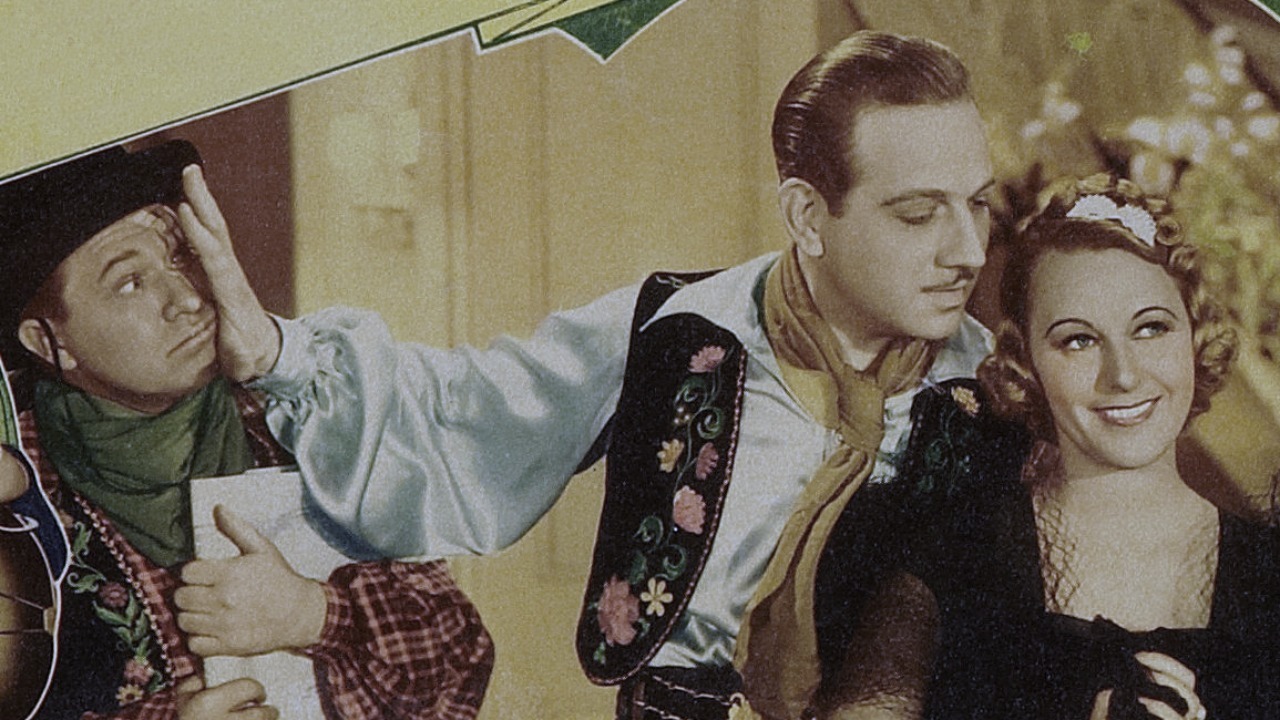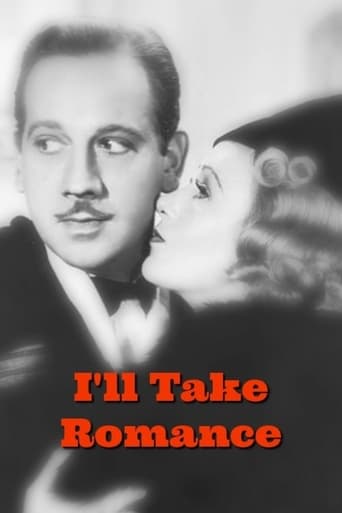

An early attempt for success in film operetta as the rival to Jeanette MacDonald didn't work well for opera diva Grace Moore ended quickly thanks to the public aversion to musicals, but the sudden success of movie musicals brought her back with a fair amount of critical acclaim and public interest. She lightened up her personality, mixing in daffy comedy with the Aria's, even tossing in a few standards and popular novelty songs. Here, she's a seemingly high strung diva who finds out that she does have a sense of fun, finding romance with agent Melvyn Douglas who is trying to get her to honor an engagement in Argentina that she's reneged on for a vacation in France. With his verve, she might change her plans, but not without some issues along the way.There's an "oom pah pah" feeling to a few of the non opera songs she gets to sing that will surely have your feet tapping. She has a sparkling personality and a dazzling smile to boot, certainly no iron butterfly (Jeanette MacDonald's nickname). In fact, she was the one to score an Old nomination for "One Night of Love" while MacDonald was overlooked for her big success, "The Merry Widow". Douglas, so serious looking, proved that he was not what he seemed as a leading man in screwball comedy. Then there's Helen Westley as her mentor, a retired opera star embittered by age yet only gruff on the outside, suddenly young again when Douglas makes up a story simply to get on her good side. Westley has several hysterical exchanges with Moore's wisecracking maid, played with a witchy know how by the scene stealing Margaret Hamilton who gets a laugh simply by commenting on her own appearance. In a brief drunk scene, she's an absolute hoot.This is the type of film that becomes charming simply because it is not as highbrow as one would expect, made with the intention of bringing classical music to the masses in an appealing way. When Moore sings a famous aria from "La Traviata", Douglas's pal, Stuart Erwin, comments on his curiosity as to why it is so often revived when it was originally a flop. Moore shows just how lovely she is when she sings the title song. It's a shame that she only made a handful of film's, as she has the look and charm of Irene Dunne, the voice of an angel, and a fantastic wardrobe. Coming from Columbia (at the time considered a poverty row studio), this has all the elegance of the majors, and is done tastefully without becoming long haired and uppity.
... View MoreI have only seen a couple of brief excerpts. The performance of the first act from Puccini's Madame Butterfly' was so amazing that I have been searching for the movie ever since. I imagine it is impossible to find. Over the years I have seen and heard many performances of "Butterfly" but there was something magical about this performance despite the grainy quality of the film.
... View MoreGrace Moore was such a talent. She would live only another 10 years as a plane crash would deny the world one of the greatest opera singers of all time.In this 1937 film, she plays a diva who is contracted to sing in Buenos Aires but instead is going to Paris. Manager Melvyn Douglas comes along and the first part of this comedy is devoted to him and his pal, Stu Irwin, trying to get in to see her. He has to resort to sublet the apartment next door to speak to her. Helen Westley steals the scenes that she is in as a long-retired, but doting aunt to Moore. It is so funny how Douglas tries to get Westley to like him.Along for the ride is none other than Margaret Hamilton as Moore's wily secretary.The film descends into constant kidnapping plots by Douglas to get Moore to Argentina. The film ends with her turning the tables on him and the scene of her singing in Madame Butterfly is a joy to watch.
... View MoreGrace Moore and Melvyn Douglas star in "I'll Take Romance," a 1937 musical film that has good support from Stuart Erwin and Margaret Hamilton.Moore plays Elsa Terry, an opera star who has two engagements at the same time, one in Paris and one in Buenos Aires. Paris is the more lucrative offer, so she decides to blow off Buenos Aires. An agent (Douglas) has the job of getting her down South America way, so he romances her. They both fall in love for real.This was Grace Moore's second-last film. She had a lovely voice, fuller than Jeannette MacDonald's. Unfortunately, the way female singers were taught in those days gave them a fluttery, back-sounding quality at the top and, due to not a lot of mixing of middle and chest voice, their middle voices were not as rich as they could have been. To think that a light, lyric voice like either MacDonald's or Moore's would attempt Tosca today is preposterous - yet both these women, with fragile instruments, actually did the role. In this film, Moore also takes on Madame Butterfly, another role that would never go to her today. Moore was a famous Mimi, a straight lyric soprano role, in La Boheme. A good deal of her singing in this film is quite beautiful.The highlight of "I'll Take Romance" is the beautiful title song performed by Moore. She also sings from Manon, Traviata, and Martha, Martha being an opera no longer in standard repertoire. The character is singing at the old Met. Impressively, the segments from Traviata and Martha are fully staged and costumed and done without cuts. The American tenor Frank Forrest sings with Moore in Butterfly, and he has a beautiful voice.This is supposed to be a screwball comedy. Moore was an easy, natural actress with no particular gift for comedy or screwball, so it doesn't quite come off. Melvyn Douglas sails through the film as he always did in these light leading man roles, and no one ever realized what an absolutely magnificent actor he was until the 1960s. Stuart Erwin and Margaret Hamilton are both very funny.The extremely popular Moore had just finished a concert in Demark before 4000 people and was en route to Sweden when the plane crashed and killed her. She was 49 and had been out of films for eight years and concentrating on concert and USO work. She helped to popularize opera in the U.S. and paved the way for later stars like Mario Lanza and Kathryn Grayson.
... View More